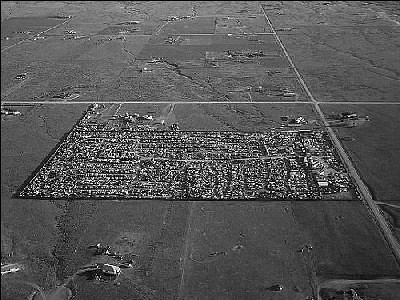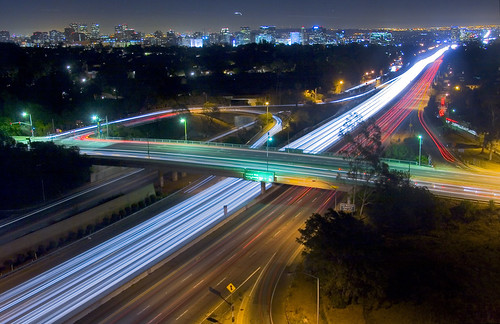The new right agenda against smart growth and sustainable transportation

The only good type of development. From A Field Guide to Sprawl, by Dolores Hayden and Jim Wark
1. In Chesterfield County, Virginia in the Richmond metropolitan area, the local tea party group is evincing opposition to the county's Growth Plan. See "Tea party objects to Chesterfield growth plan" from the Richmond Times-Dispatch. Growth plans complement a community's master/comprehensive land use plan to more sensitively manage the impacts of development and change.
The opposition uses the anti-smart growth narrative that smart growth planning causes housing prices to rise, and say that their opposition is motivated by a desire to preserve affordable housing.
The issue is a lot more complicated. In strong markets, with planning controls or not, land values rise. In real estate development generally, only with government support is it likely that the inventory of "affordable housing" rises, because yielding higher rates of return on investment requires that the most profitable housing be constructed--that's not affordable housing.
2. Governor Scott Walker in Wisconsin is also proposing to eliminate the bicycle and pedestrian planning and infrastructure program within that state's Department of Transportation. See "Budget cuts spending on bicycle, pedestrian paths" from the Milwaukee Journal-Sentinel.
Interestingly enough, Wisconsin has a very large bicycle-related economy, as a number of manufacturers are based there, and there is a large bicycle tourism effort. From the article:
Hardman and other advocates estimate the economic impact of cycling in Wisconsin is roughly $1.5 billion annually, based on a study by graduate students in the Nelson Institute for Environmental Studies at the University of Wisconsin-Madison.
Among the report's findings, cyclists riding on Wisconsin's roads and trails spend roughly $533 million on food, drinks, entertainment and other expenses related to their sport each year.
Adding the indirect revenue generated for businesses, the money generated by bicyclists pedaling in the state reaches roughly $924 million, according to the report. The cycling industry in Wisconsin - manufacturers, distributors and retailers - accounts for another $594 million in economic benefit, according to the report titled, "Valuing Bicycling's Economic and Health Impacts in Wisconsin."
3. Gov. Walker goes after transit too. According to the Journal-Sentinel editorial, "Busting bus systems":
• Walker's budget would slice transit aids in the first year of the biennium and provide no alternative dedicated local funding source to help meet already financially troubled systems.
• The budget shifts transit aids from the segregated and protected transportation fund to the general fund, where transit systems would have to compete with myriad services for scarce dollars. Walker argues that the gasoline tax that largely supplies the transportation fund is a user fee paid for by drivers and should be used only on those roads that drivers use.
But mass transit helps ease pressure on those roads and gives drivers other choices, as Steve Hiniker of 1000 Friends of Wisconsin, points out. Buses are a vital form of transportation.
• A separate bill in the Legislature would kill regional transit authorities that were created in recent years to help regions strengthen and support local transit systems. ...
• Walker's budget bill freezes local tax levy increases, meaning that even if a community wanted to spend more on transit, it couldn't.
4. Of course, Gov. Walker already ended Wisconsin's participation in high speed rail service, which led a major high speed rail manufacturer to announce that they would be leaving the state and relocating to a state that was more favorable. See "Talgo: 'We can't stay and manufacture in Milwaukee'" from the Milwaukee Daily Reporter. Employment at the plant was expected to rise to about 125 people.

The only good form of transportation. 405 Freeway at Sunset Boulevard, Los Angeles. Flickr photo by gsgeorge.
Labels: elections and campaigns, electoral politics and influence, smart growth, sustainable land use and resource planning, transportation planning



0 Comments:
Post a Comment
<< Home